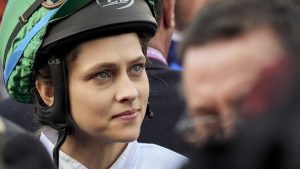THE story of the first female jockey to win Australia’s greatest horse race is a terrific one.
Michelle Payne was only 20 years old and barely five years into her professional career when she beat an international field of experienced riders to win the 2015 Melbourne Cup aboard Prince of Penzance.
The 100-1 long shot had almost been put out to pasture a couple of times and Payne herself had broken 16 bones and had seven falls, including one that nearly ended her career.
She grew up in Ballarat, one of ten children brought up by single father Paddy. Eight of the kids became jockeys including an older sister who died in a fall.
I recount all this because it should make for a fantastic film.
Ride Like A Girl is thoroughly watchable, efficiently made and energetically acted, but doesn’t have the emotional heft you would expect from such an amazing true story.
The early section of the film, during which we are introduced to the family’s chaotic, racing-fixated life in the early 1990s, is humorous and entertaining but skips over the impact Michelle’s mother’s premature death must have had.
We then jump a decade to Michelle as a teenager determined to forge a career, but the general pressures of growing up and the impact of her sister’s death as well as fightuing her way in a male-dominated world, as Michelle so strongly made known in her Cup acceptance speech, are given minimal attention.
It’s as if first-time director, Australian actress Rachel Griffiths, was as determined as Payne herself to get to the starting gates and win that race.
The best sections of the film show the wonderful relationship between Michelle and her father. In the lead role Teresa Palmer is fine but her best work is when she’s paired with the veteran Sam Neil playing Paddy.
Several familiar faces, including Sullivan Stapleton, Mick Molloy, Magda Szubanski and Shane Bourne, are along for the ride in entertaining smaller roles.
You can’t help but enjoy the film because of the incredible determination and passion in the story, but perhaps Griffiths and her writers, Andrew Knight and Elise McCredie, should have slowed things down and played out the drama a little more.
